
SNAP-37889
CAS No. 303149-14-6
SNAP-37889 ( HT-2157 | HT2157 | HT 2157 | SNAP37889 | SNAP 37889 )
产品货号. M13954 CAS No. 303149-14-6
一种有效的选择性甘丙肽 3 受体 (Gal3) 拮抗剂,Ki 为 17.44 nM,对 Gal3 的选择性高于 Gal1 和 Gal2 亚型(Ki 均 >10 uM)。
纯度: >98% (HPLC)
 COA
COA
 Datasheet
Datasheet
 HNMR
HNMR
 HPLC
HPLC
 MSDS
MSDS
 Handing Instructions
Handing Instructions
| 规格 | 价格/人民币 | 库存 | 数量 |
| 5MG | ¥413 | 有现货 |


|
| 10MG | ¥721 | 有现货 |


|
| 25MG | ¥1401 | 有现货 |


|
| 50MG | ¥2568 | 有现货 |


|
| 100MG | ¥4317 | 有现货 |


|
| 200MG | 获取报价 | 有现货 |


|
| 500MG | 获取报价 | 有现货 |


|
| 1G | 获取报价 | 有现货 |


|
生物学信息
-
产品名称SNAP-37889
-
注意事项本公司产品仅用于科研实验,不得用于人体或动物的临床与诊断
-
产品简述一种有效的选择性甘丙肽 3 受体 (Gal3) 拮抗剂,Ki 为 17.44 nM,对 Gal3 的选择性高于 Gal1 和 Gal2 亚型(Ki 均 >10 uM)。
-
产品描述A potent, selective galanin-3 receptor (Gal3) antagonist with Ki of 17.44 nM, displays highly selective for Gal3 over the Gal1 and Gal2 subtypes (both Ki >10 uM); attenuates stress-induced hyperthermia in mice, partially antagonizes the galanin-evoked reduction in hippocampal serotonin, exhibits anxiolytic- and antidepressant-like profiles in vivo.Depression Phase 2 Clinical(In Vitro):HT-2157 (SNAP 37889) binds with high affinity to membranes from transiently transfected LMTK- cells expressing the human Gal3 receptor (Ki=17.44±0.01 nM; n>100) and is highly selective for Gal3 over the Gal1 and Gal2 subtypes (Ki>10,000 nM for each subtype; n=46 of each subtype). When tested for the antagonism of galanin-evoked inhibition of adenylyl cyclase, HT-2157 (0.1-10 μM) produces concentration-dependent rightward shifts of the concentration-effect curve to galanin. (In Vivo):The galanin-3 receptor antagonist, HT-2157 (SNAP 37889), reduces operant responding for ethanol in alcohol-preferring rats. The novel selective GALR3 antagonist, HT-2157, to reduce anxiety-like behaviour and voluntary ethanol consumption in the iP (alcohol-preferring) rat. Male iP rats treated with HT-2157 at a dose of 30 mg/kg (i.p.) do not show altered locomotor activity or changes in anxiety-like behaviour in the elevated plus maze or light-dark paradigms. Treatment with HT-2157 (30 mg/kg, i.p.) reduces operant responding for solutions containing ethanol, sucrose and saccharin. Collectively, results from the current study shows that HT-2157 (30 mg/kg, i.p.) is effective in reducing operant responding for ethanol.
-
体外实验HT-2157 (SNAP 37889) binds with high affinity to membranes from transiently transfected LMTK- cells expressing the human Gal3 receptor (Ki=17.44±0.01 nM; n>100) and is highly selective for Gal3 over the Gal1 and Gal2 subtypes (Ki>10,000 nM for each subtype; n=46 of each subtype). When tested for the antagonism of galanin-evoked inhibition of adenylyl cyclase, HT-2157 (0.1-10 μM) produces concentration-dependent rightward shifts of the concentration-effect curve to galanin.
-
体内实验The galanin-3 receptor antagonist, HT-2157 (SNAP 37889), reduces operant responding for ethanol in alcohol-preferring rats. The novel selective GALR3 antagonist, HT-2157, to reduce anxiety-like behaviour and voluntary ethanol consumption in the iP (alcohol-preferring) rat. Male iP rats treated with HT-2157 at a dose of 30 mg/kg (i.p.) do not show altered locomotor activity or changes in anxiety-like behaviour in the elevated plus maze or light-dark paradigms. Treatment with HT-2157 (30 mg/kg, i.p.) reduces operant responding for solutions containing ethanol, sucrose and saccharin. Collectively, results from the current study shows that HT-2157 (30 mg/kg, i.p.) is effective in reducing operant responding for ethanol.
-
同义词HT-2157 | HT2157 | HT 2157 | SNAP37889 | SNAP 37889
-
通路GPCR/G Protein
-
靶点Galanin Receptor
-
受体Galanin Receptor
-
研究领域Neurological Disease
-
适应症Depression
化学信息
-
CAS Number303149-14-6
-
分子量366.3359
-
分子式C21H13F3N2O
-
纯度>98% (HPLC)
-
溶解度DMSO: ≥ 29 mg/mL
-
SMILESO=C1N(C2=CC=CC=C2)C3=C(C=CC=C3)/C1=N/C4=CC=CC(C(F)(F)F)=C4
-
化学全称2H-Indol-2-one, 1,3-dihydro-1-phenyl-3-[[3-(trifluoromethyl)phenyl]imino]-
运输与储存
-
储存条件(-20℃)
-
运输条件With Ice Pack
-
稳定性≥ 2 years
参考文献
1. Swanson CJ, et al. Proc Natl Acad Sci U S A. 2005 Nov 29;102(48):17489-94.
2. Ash BL, et al. Regul Pept. 2011 Jan 17;166(1-3):59-67.
3. Koller A, et al. Neuropeptides. 2016 Apr;56:83-8.
4. Scheller KJ, et al. Neuropharmacology. 2017 May 15;118:1-12.



 021-51111890
021-51111890 购物车(0)
购物车(0)
 sales@molnova.cn
sales@molnova.cn











